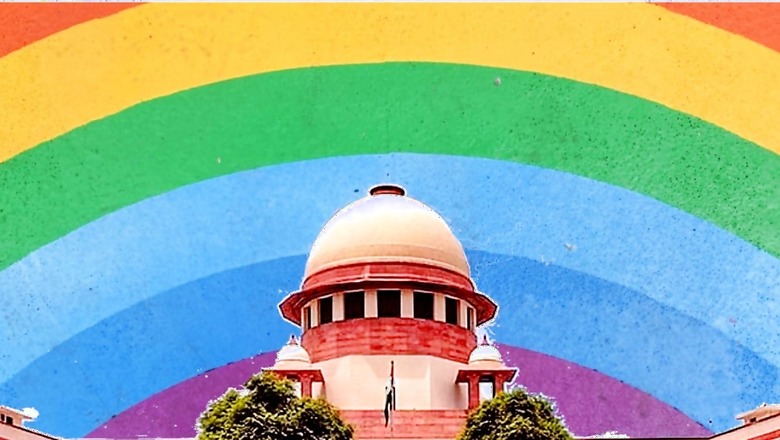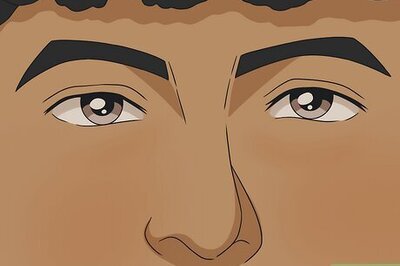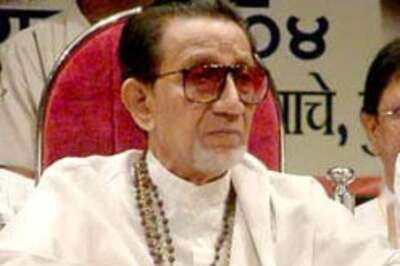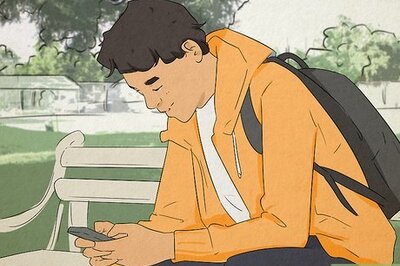
views
In a big blow to hundreds of LGBT couples who were hoping to tie the knot officially, the Supreme Court on Tuesday refused to legalise same-sex marriages in India and said it can’t compel the Parliament or the State to create a new institution of marriage.
While pronouncing the verdicts on 21 petitions seeking legal sanction for same-sex marriages, a five-judge constitution bench of the Supreme Court ruled that it is within Parliament’s ambit to change the law for validating such a union.
Same-Sex Marriage: What SC Ruled on Adoption, Special Marriage Act, Civil Union | Key Takeaways
The top court, however, recognised equal rights for queer people and their protection, while calling for sensitisation of the general public so they don’t face discrimination.
It was a 3:2 judgment on various points, including adoption, with Justice Kohli, Bhat, and Narasimha on one side, and Justice Chandrachud and Kaul on the other.
“Whether a change in the Special Marriage Act (SMA) is needed is for the parliament to ascertain and the court must be careful to enter into the legislative domain,” Chief Justice of India (CJI) D Y Chandrachud further said
‘No Unqualified Right to Marriage’
While passing four separate verdicts, the apex court was unanimous in holding that there is “no unqualified right” to marriage, and same-sex couples can’t claim it as a fundamental right under the Constitution.
“There is no unqualified right to marriage. Conferring legal status to a civil union can only be through enacted law. But these findings will not preclude the right of queer persons to enter into relationships. The challenge to the Special Marriage Act on the grounds of under-classification is not made out,” Justice Bhat was quoted as saying by LiveLaw.
“Consistent with the statement made to the Court, the Union will set up a High Powered Committee to examine the rights and benefits of queer couples. Transsexual persons in homosexual relationships have the right to marry. CARA regulations are not void for not allowing queer couples to adopt,” Justice Bhat said, concluding his judgment.
CJI DY Chandrachud said all persons, including queer persons, have the right to judge the moral quality of their lives. “For full enjoyment of such relationships, these unions require recognition and there can’t be a denial of basic goods and services, ” he added.
However, CJI Chandrachud also stated that the court can’t compel the Parliament or the State to create a new institution of marriage and that Section 4 of the Special Marriage Act (SMA) can’t be held to be unconstitutional just because it doesn’t include same-sex couples.
‘Homosexuality Not an Elitist Concept’
CJI DY Chandrachud, while pronouncing the verdict, said homosexuality and queerness are “not an elitist concept”. “It’s not even a concept that is specific to upper class,” he added.
3:2 Judgment on Adoption Rights to Queer Couples
The top court also refused adoption rights to queer couples in a 3:2 verdict.
The CJI said the law cannot assume that only heterosexual couples can be good parents as it would amount to discrimination against queer couples.
‘Marriage Metamorphosed From Sati to Inter-caste’
CJI Chandrachud further stressed that to image queer people exist only in urban and elite spaces is to erase them.
He also highlighted the transition in the concept of marriage in the society saying it has metamorphosed from Sati to inter-caste. “It would be incorrect to state that marriage is a static and unchanging institution. Reforms in marriage have been brought about by Acts of the legislature. Parliament has enacted laws for the socio-economic concept of marriage,” he said.
Earlier this year on May 11, a five-judge constitution bench headed by Chief Justice DY Chandrachud had reserved its verdict on the pleas after a 10-day marathon hearing. The bench comprised CJI DY Chandrachud, Justice Sanjay Kishan Kaul, Justice S Ravindra Bhat, Justice Hima Kohli and Justice PS Narasimha.
Same-sex partners from around the country had approached the Top Court with a plea demanding same-sex marriages be legalised under the Special Marriage Act.
LGBTQI couples, petitioners, and activists have organised a joint press conference today to telecast LIVE the Supreme Court’s verdict on same-sex marriage.
During the hearing, the Union government had agreed to set up a committee to examine the administrative steps that could be undertaken to address some of the concerns in connection with basic social benefits for same-sex couples. The committee is headed by the Cabinet Secretary.
The Supreme Court on Wednesday had observed that the suggestion of the Centre to form a committee to address ‘human concerns’ of same-sex couples is a ‘very fair suggestion’. The petitioners were advised to sit with the government and chalk out issues that the committee could look into.
Timeline of LGBTQ Rights in India
The Supreme Court granted certain rights to the transgender community in 2014 and in 2018, scrapped the law that criminalised same-sex relationships, in a huge victory for the LGBTQ community.


















Comments
0 comment